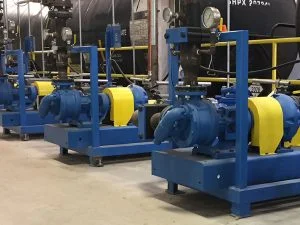

Last month I shared with you six mistakes that could be shortening the life of your pumps. In this follow up article I’ll share with you another six mistakes that could be shortening the life of your pumps.
Not Minimizing Radial Force
Industry statistics indicate that the biggest reason centrifugal pumps are pulled from service is the failure of bearings and/or mechanical seals. Bearings and seals wear and tear give you a good idea of what is happening inside the pumping system.
To minimize radial force run your pump at its Best Efficiency Point (BEP). At its BEP, by design pumps will experience the lowest amount of radial force. High radial force and shaft deflection are a killer of mechanical seals and a contributing factor to bearing life reduction.
Not Changing Your Oil On Schedule.
For ball bearings, more than 85 percent of bearing failures result from contamination, either dirt and foreign material or water. Just 250 parts per million (ppm) of water will reduce bearing life by a factor of four.
Operating a pump can be similar to operating a car continuously at 60 miles per hour… Driving 24 hours per day, seven days a week, puts plenty of ‘miles on the clock’ —1,440 miles per day, 10,080 miles per week, or if you will 524,160 miles per year. You’d be checking your car’s oil regularly if you were doing those sorts of miles wouldn’t you? Why not check your pump’s oil regularly too?
Not Reducing The Risk of Cavitation.
Cavitation will create damage to the pump impeller, and resultant vibrations will affect the seals and bearings. Cavitation is minimized by having a large margin between net positive suction head available (NPSHA) and the net positive suction head required (NPSHRR).
Running Your Pump At High Speeds
A 3600-rpm pump will wear out faster than a 1800-rpm pump by a factor of 4-to-8. So if you’ve got to run a pump at high RPMs, when it does finally wear out be sure to look for a pump that can move the same volume of material while running at a lower speed.
Unbalanced Impellers
I recommend that impellers be balanced to International Organization for Standardization (ISO) 1940 grade 6.3 standards at a minimum. If the impeller is trimmed for any reason, it must be re-balanced.
An unbalanced impeller on an overhung pump or on some vertical designs can cause a condition known as shaft whip, which deflects the shaft just as a radial force does when the pump operates away from the BEP. Radial deflection and whip can occur at the same time.
Too Many Casing Penetrations
Many end users want the casing drilled and tapped for drains, vents, gauge ports or instrumentation. The problem is pump casing penetrations shorten pump life. Every penetration is primed for corrosion and stress risers. It’s a trade-off.
If you find yourself frustrated with pumps being continuously offline for unscheduled maintenance or need to increase the life of your pumps give the team at Pye-Barker a call at 404-363-6000 or drop us a line at sales@pyebarker.com we will advise you on your best options to increase your pump life.


